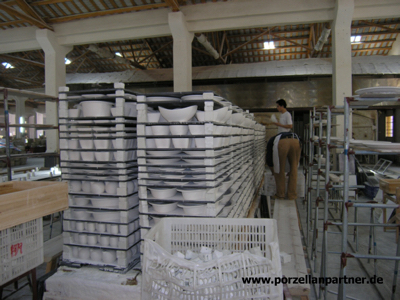Cost factor
The cost factor "fire & kiln" in porcelain production
Cost factor porcelain firing

The German porcelain bible of Hans Friedl from 1987 describes the firing costs as the majority cost factor of the porcelain industry. Certainly this statement dates back to the time when the kilns in the bavarian mountains Fichtelgebirge were still fired with coal, but on the other hand, energy costs have increased more than fivefold since then. Modern production mechanisms and heat recovery systems certainly contribute to a sustainable reduction in the energy costs of a factory. Nevertheless, at least 1,320 °C must be reached at the end of the day, regardless of the factory, in order to bring porcelain into the desired sintering process. Raw materials have also become more expensive in recent decades, mainly because many factories have switched to ready-mixes. The admixture of high-quality additives such as alumina, bone ash etc. are also costly elements. Nevertheless and finally, energy costs are still a considerable cost factor. It should not be wrong if we claim between 30% and 60%, depending on the location, standard and equipment of the factories.
Now it is ready, the "white gold"...No matter if "plain & strong" Made in Turkey, China, Austria, Egypt or Germany. Even if our German porcelain industry may not believe it, there is hardly any material or manufacturing difference between Tchibo and manufactured goods! With this realisation, the Tchibo price of € 19.95 for a 15-piece coffee set including VAT suddenly seems incredible when you have to pay € 150 for a premium tableware set in a specialist shop.
The value, quality and customer perception is only achieved through the bottom stamp and quality sorting; behind the oven door in production they are all still the same! Only the bottom stamp gives the shard the true "royal", "Prussian", noble, expensive, modern...
Our aim is to create a range of products with the "Schlicht & Stark" label, which allows the supplier to "live" and our retail partners to "earn" and, above all, "delight" the end customer. The more people, workers and employees can live from our goods, the better!
